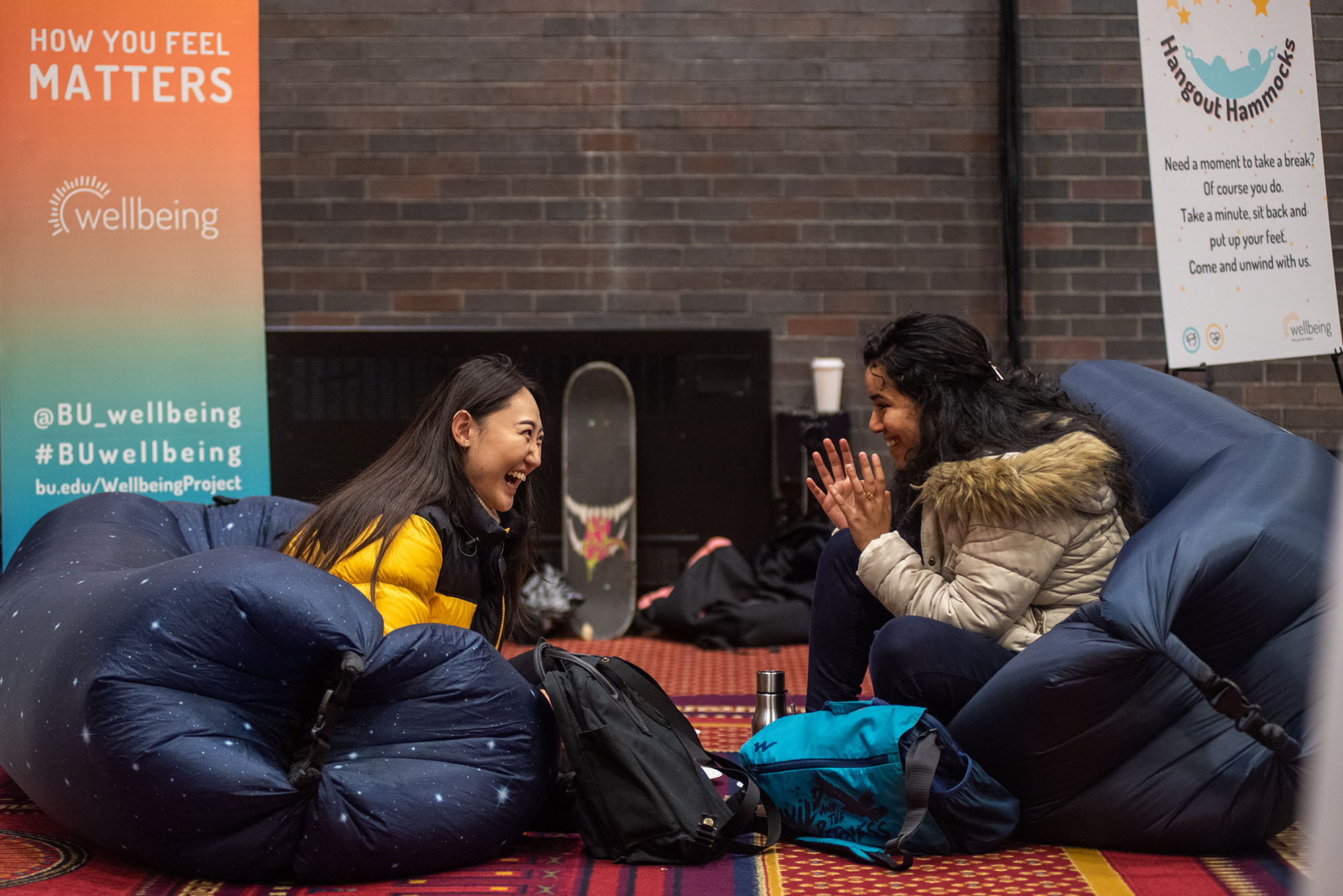Break Time? De-stress at the Student Wellbeing Experience

Anu Shinebayer (MET’24) (left) and Inthumathi Chandrasekaran (MET’24) hanging at last year’s Wellbeing Experience.
Break Time? De-stress at the Student Wellbeing Experience
Play games, relax in a hammock, and enjoy free food at today’s event at the GSU
Are you OK?
Final exam season is like running the final stretch of a seemingly never-ending marathon. Exhaustion overtakes enthusiasm, isolation is inevitable, and of course, burnout ensues.
This Wednesday, step away from your screen and take a purposeful study break at the Wellbeing Experience, a day filled with community, connection, and free food.
“We’re social creatures and going through something like finals, it’s just inherently stressful,” says Pedro Falci (COM’11, Wheelock’15), director of Student Wellbeing. “So, there’s something communal about getting to share that burden with fellow peers and talk it out. Taking a break now before that stretch really kicks in to recharge your physical batteries, your mental batteries, and emotional batteries.”
Falci works with student groups, departments, and colleges at BU to support and develop programs that meet students’ needs as part of a campus-wide well-being initiative.
For today’s event, he and his team developed seven stations: board games, chatting (without phones!), bracelet-making, community coloring, rock-painting, painting pots and planting potted succulents, and a zen meditation zone with hammocks. Soft pretzels, hot chocolate, fruit, cookies, and brownies will be available to nosh on.
“The stations are all designed to help students primarily socialize, but also enjoy an activity that we hope can take their mind off whatever stressors they’re dealing with and be present with each other,” Falci says. “These activities really draw attention to the task itself and help practice mindfulness.”
Research shows that taking purposeful study breaks, from as little as five minutes to an hour, increases energy, productivity, and the ability to focus. Scientists at the National Institutes of Health also discovered that resting the brain repeatedly replays compressed memories of what was just practiced, helping our brains learn new skills, according to a study released in 2021.
Going for a walk, binging Netflix shows, picking up an instrument, or going to FitRec for a workout—“whatever it is that brings you joy as a hobby, incentivize yourself almost like a reward system,” Falci says. “Put that in your calendar.”
Beyond this week’s event, Student Wellbeing offers students a free subscription to the Headspace App, which includes a “student essentials” module, with videos on meditation, managing stress, and getting quality sleep.
“Students may be tempted to pull all-nighters or cram as much information as possible ahead of an exam,” Falci says. “But doing that repeatedly can really have a snowball effect on their emotional and intellectual well-being, and that could prompt even more stress, more anxiety, more nervousness around exams.”
Instead, he recommends getting quality sleep for seven to nine hours, meditating, and understanding the importance of taking some well-deserved time for yourself.
“Hopefully students come and have a good time at the event,” Falci says. “But more importantly, they [leave] inspired to continue doing these things that bring them joy and help them feel like they can really weather the stressors that accompany the final exam period.”

Comments & Discussion
Boston University moderates comments to facilitate an informed, substantive, civil conversation. Abusive, profane, self-promotional, misleading, incoherent or off-topic comments will be rejected. Moderators are staffed during regular business hours (EST) and can only accept comments written in English. Statistics or facts must include a citation or a link to the citation.